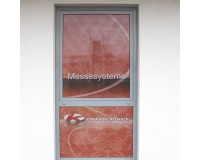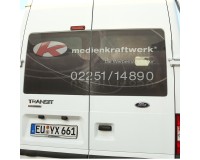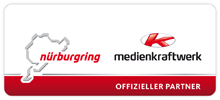Perforated foil
Perforated film - The versatile solution for advertising and privacy protection
Perforated film, also known as perforated film or micro-perforated film, has gained more and more popularity in recent years. This is mainly because it can be used as an advertising medium and as a privacy screen. But what exactly is behind this term?
What is perforated film and how does it work?
Perforated films consist of a self-adhesive film perforated with tiny holes. These holes are so small that they are imperceptible to the human eye. As a result, the film is opaque from the outside and provides privacy. From the inside, however, it is visible and translucent. This means that you can see from the inside to the outside, but at the same time the film allows daylight to pass through. This makes it ideal for shop windows, car windows, buses and other smooth surfaces.
How to apply perforated film?
The self-adhesive perforated films can be easily and quickly applied to all smooth surfaces. To do this, the surfaces must first be thoroughly cleaned and freed from dirt and dust. Then the film can be applied evenly with the help of a squeegee or similar tool. Care should be taken to ensure that no bubbles or wrinkles are formed. If this is the case, the film can be carefully removed and reapplied.
What are the advantages of perforated film?
The perforated film has many advantages to offer. Here are some of the most important:
- Advertising media: The perforated film is ideal for use as an advertising medium. The perforated design allows images and text printed on the film to be seen from the outside, while it remains translucent from the inside. This allows companies to effectively place their advertising messages on the outside of buildings or vehicles.
- Privacy protection: Perforated films are also excellent for privacy protection. Since they are opaque from the outside, you can work or stay undisturbed inside a building or vehicle without passers-by or other people having a view.
- Easy application: Perforated films can be easily and quickly applied to all smooth surfaces. This saves time and money compared to other privacy and advertising methods.
- Weather resistant: Perforated films are usually weather resistant and can withstand heavy rain and snowfall.
- Certification: The ABE certified version of the perforated film is even suitable for use on bus and car windows and thus meets all legal requirements for road traffic.
Questions and answers:
How to clean perforated film?
Perforated film can be cleaned with a damp cloth and mild detergent. However, care should be taken not to use harsh detergents or scratchy sponges, as this can damage the surface of the foil.
How long does a perforated film last?
The durability of a perforated film depends on various factors, such as the quality of the film and the environmental conditions. However, they usually last for several years if properly applied and maintained.
Can perforated film also be used indoors?
Yes, perforated film can also be used indoors, for example as a privacy screen for bathroom windows or as a decorative element in living rooms.
Conclusion
Overall, the perforated film offers a versatile and practical solution for advertising and privacy protection on smooth surfaces. Whether outdoors or indoors, on buildings or vehicles, the self-adhesive film is easy to apply, weather-resistant and even meets all legal requirements for road traffic. By combining advertising and visual protection, the perforated film can thus be a worthwhile investment for both companies and private purposes.

 ISOframe wave
ISOframe wave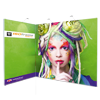 ISOframe Fabric
ISOframe Fabric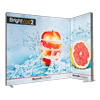 Illuminated walls
Illuminated walls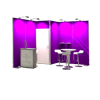 OCTAwall
OCTAwall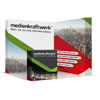 UltraTex - textile folding display
UltraTex - textile folding display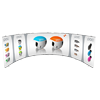 Expand LinkWall
Expand LinkWall Exhibition walls
Exhibition walls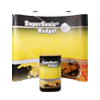 Folding displays
Folding displays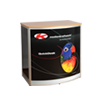 Promotion counters
Promotion counters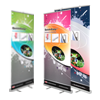 RollUp Displays
RollUp Displays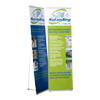 Banner displays
Banner displays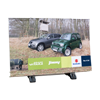 Outdoor displays
Outdoor displays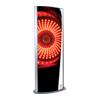 Illuminated displays
Illuminated displays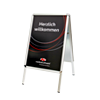 Customer stopper
Customer stopper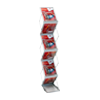 Brochure stand
Brochure stand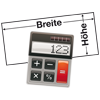 Calculate advertising signs online
Calculate advertising signs online Forex pressure
Forex pressure Print on alu dibond
Print on alu dibond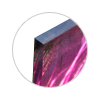 Printing on acrylic glass
Printing on acrylic glass Warning and information signs
Warning and information signs Sign mounting
Sign mounting Your photo on canvas
Your photo on canvas Your photo as poster
Your photo as poster Your photo on acrylic glass
Your photo on acrylic glass Your photo as gallery print
Your photo as gallery print Your photo on alu dibond
Your photo on alu dibond Your photo on forex
Your photo on forex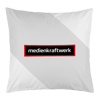 Photo textiles
Photo textiles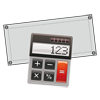 Calculate banner / advertising tarpaulin online
Calculate banner / advertising tarpaulin online Sticker / Foil Calculator
Sticker / Foil Calculator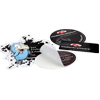 Foil cut stickers
Foil cut stickers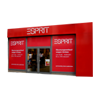 Window sticker
Window sticker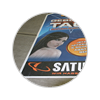 Floor advertising
Floor advertising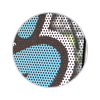 Perforated foil
Perforated foil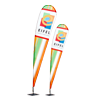 DropFlag
DropFlag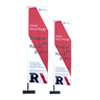 PoleFlag
PoleFlag SharkFlag
SharkFlag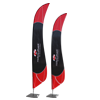 WingFlag
WingFlag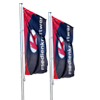 Hoist flags
Hoist flags